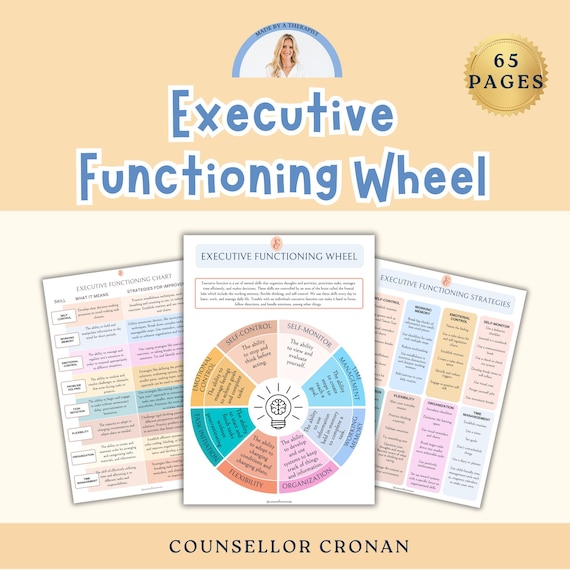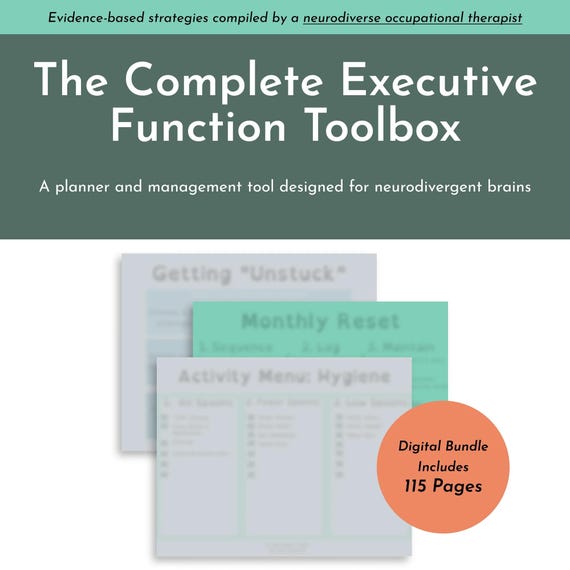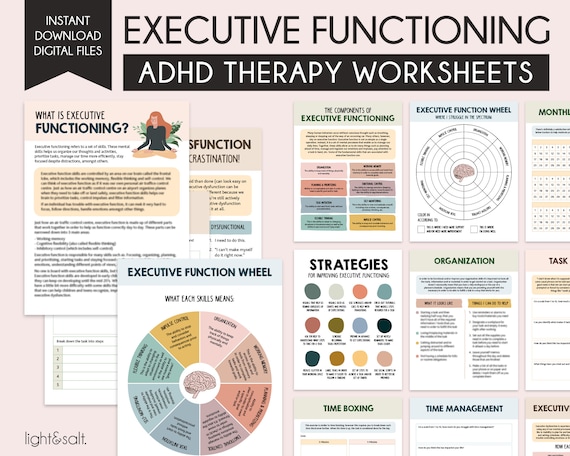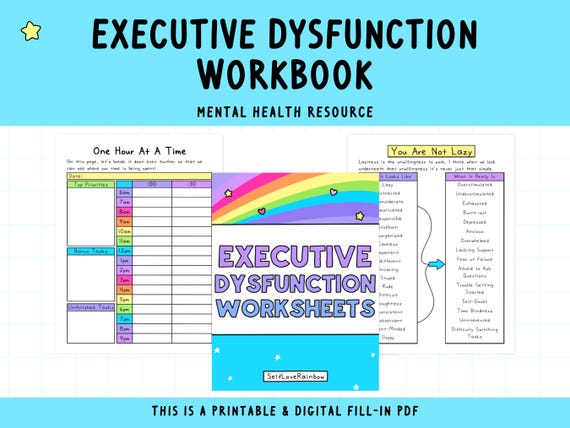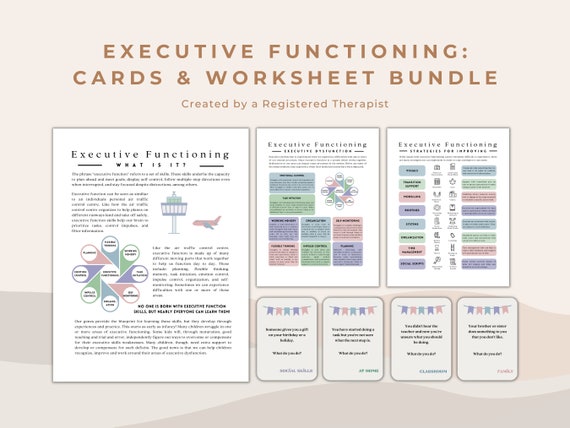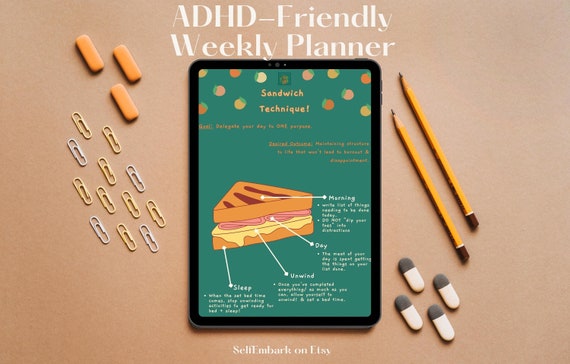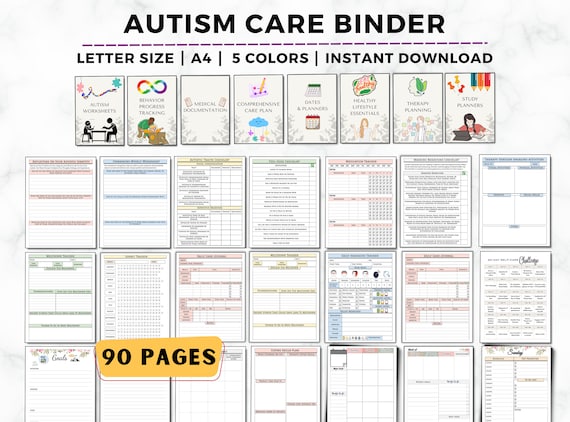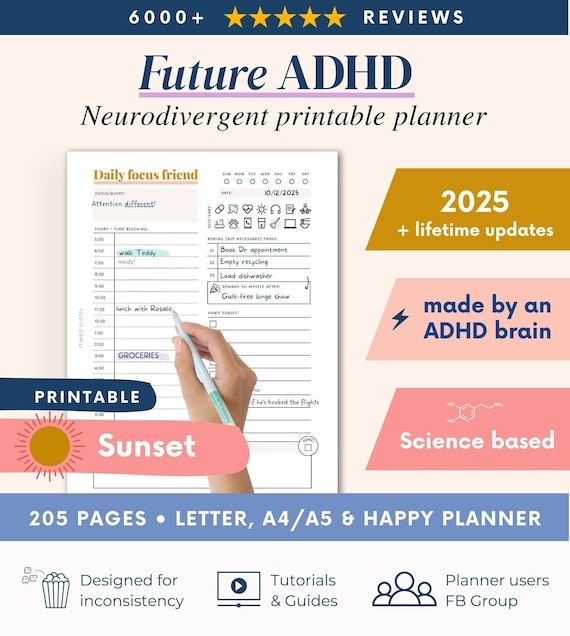
Welcome to the ultimate self-help guide for coping with executive dysfunction! If you struggle with executive functioning skills such as managing time, staying organized, and completing tasks, you're not alone. Many people experience difficulties in these areas, and it can be frustrating and overwhelming. However, the good news is that there are practical coping skills and strategies you can implement to improve your daily functioning and reduce stress. In this article, we'll explore the causes and symptoms of executive dysfunction and provide actionable tips for managing your executive functioning challenges. So grab a cup of coffee, get comfortable, and let's get started!
Our guide is unique because we are a group of experts who have both lived and professional experience with executive functioning challenges. We are: Olivia Jayne, an autistic person and professional medical writer; Karin Willison, MA Psychology, founder of The Ability Toolbox, who has cerebral palsy and sensory processing disorder; and Charlotte Wilson, MD, a family physician who lives with ADHD and has many pediatric patients who are on the autism spectrum. We aim to provide factual information along with meaningful support and solutions that are neurodiversity-affirming.
This article contains affiliate links, which means we may receive a small commission at no added cost to you. As an Amazon associate, we earn from qualifying purchases.
What is executive dysfunction?
Executive dysfunction is a term used to describe difficulties in the brain's executive functioning system, which is responsible for planning, organizing, initiating, and completing tasks. People with executive dysfunction may struggle with time management, attention, decision-making, and impulse control. Executive dysfunction can affect a person's daily life, including their ability to work, study, and maintain relationships. However, with the right coping skills and support, people with executive dysfunction can learn to manage their challenges and live fulfilling lives.
The 8 Areas of Executive Function
Executive functioning skills can be broken down into eight main categories, as seen in this executive functioning wheel.
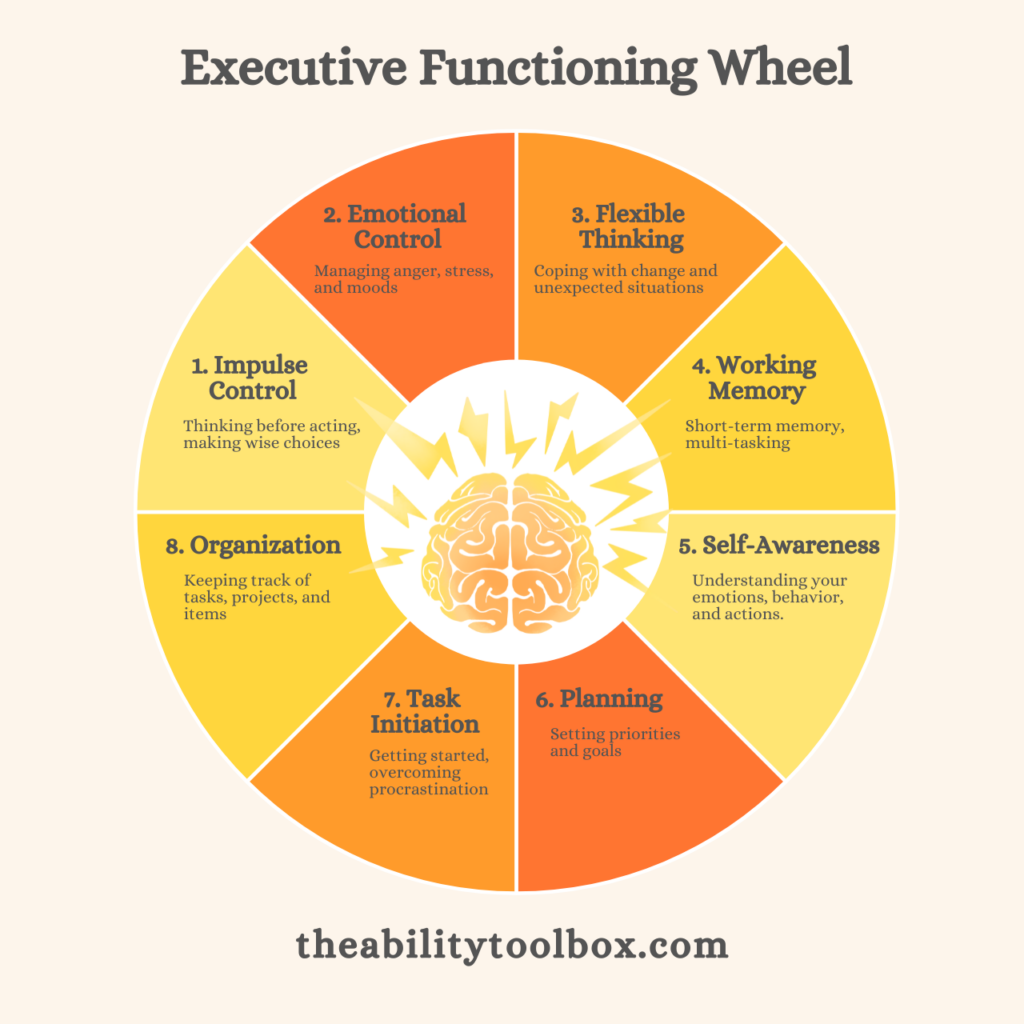
Let's discuss each section in more depth.
Inhibition and Impulse Control
Inhibition is your brain's ability to say “no,” to stop and think before taking action. Inhibitory control allows people to ignore distractions, stay focused, plan their actions, and make wise decisions. Inhibition keeps us safe physically and helps us behave appropriately in social situations.
People with inhibition deficits may be easily distracted and struggle to pay attention at work or in school. They may be impulsive and make decisions without planning or considering their own safety and well-being or that of others. They may have no filter and say whatever comes to mind, inadvertently hurting other people's feelings.
Emotional Control
Emotional control is an aspect of inhibition and specifically refers to the ability to regulate how we express our emotions. Learning to manage our anger, stress, and other strong feelings is a key aspect of human development, but it can be harder for neurodivergent children and adults. Developmental disabilities and brain injuries can also cause emotional lability — rapidly shifting, intense moods that may be out of proportion to the circumstances.
Cognitive Flexibility
Cognitive flexibility is the ability to engage in problem solving and shift between different tasks or ways of thinking as situations change. It's important because it helps us develop new ideas and adapt to unexpected circumstances. People with high cognitive flexibility can quickly adjust to new situations, while people with low cognitive flexibility may have trouble with change. We can improve our cognitive flexibility with practice, so it's a helpful skill to work on.
People with cognitive flexibility deficits may have a strong need for routine, show rigidity in their food, clothing, hobbies, and other preferences, and struggle when things don't go according to plan.
Working Memory
Working memory is a system in our brain that helps us hold and manipulate the information we need to complete tasks like solving problems, making decisions, and understanding language. It's like a temporary workspace in our minds, with a limited capacity and duration. We can improve our working memory through practice and training, which can help us perform better mentally.
“Brain fog” is a type of working memory deficit that includes short-term memory loss, mental fatigue, and slow information processing. It's common among people with autoimmune and neurological disorders, and can be especially debilitating.
Self-Awareness
Self-awareness in the context of executive function is the ability to understand our emotions, behavior, and actions. Neurodivergent people often struggle with alexithymia, the inability to understand what one is feeling.
Task Initiation
Task initiation is the ability to get started and motivate ourselves to do something. Having an executive function deficit in task initiation is one of the most stigmatized disorders, as people with these challenges are often labeled “lazy” when they are not. We all know the feeling of procrastination, where we delay and make excuses instead of doing something. But people who procrastinate daily or frequently feel severe anxiety about starting a necessary task may be struggling with something more serious and need treatment and support.
Planning
Planning includes setting priorities and goals, and managing time and energy. Children and adults with executive function challenges often have difficulty deciding which tasks and activities are most important and what order to do them in. They may tend to do things they want to do or that come easily for them while avoiding harder but more important tasks. They may struggle to do tasks in the correct or optimal order, inadvertently making life more complicated for themselves and those around them.
Organization
Organization is closely related to planning and includes the ability to group one's thoughts and ideas logically, keep track of items, put items in their proper place, and complete assignments. People with executive dysfunction may miss appointments or run late all the time. They may miss a deadline for one assignment or project because they became hyper-focused on another one. They may struggle with object permanence, forgetting they have something or need to do something unless it is right in front of them.
Combination Skills
Many complex tasks require a combination of the executive functioning skill areas described above. For example, multitasking involves keeping track of more than one activity at once (planning, working memory), adapting and changing priorities on the fly (cognitive flexibility), and staying focused on the tasks at hand (organization, inhibition).
Executive Function and Intelligence
Executive functioning skills do not inherently make someone intelligent or not. You are not “stupid” if you have executive dysfunction. In fact, many of the greatest minds in history, including Albert Einstein, Thomas Edison, Steve Jobs, Bobby Fischer, Temple Grandin, and MANY more are known or believed to have been autistic.
People with ADHD-related executive functioning differences often excel in creative professions because they see the world from unique perspectives. Numerous celebrities have spoken openly about living with ADHD, including Channing Tatum, Justin Timberlake, Solange, and Lisa Ling.
As neurodivergent people, we live in a world that is not set up for us and assumes that we think in typical ways, leading to misunderstandings and judgment when we need to do things differently. Executive dysfunction does not make us “less than” anyone else and it often brings gifts along with the challenges. People with executive function difficulties need support, understanding, and accommodations at work and school to live our best lives — and that's OK.
What causes executive dysfunction?
Executive dysfunction is caused by the brain, primarily the prefrontal cortex, not working as it should. Executive functioning is controlled by various regions of the brain, but the prefrontal cortex (PFC) is considered the main area responsible for these functions. The PFC is located at the front of the brain and plays a critical role in planning, decision-making, impulse control, working memory, and cognitive flexibility. Different regions of the PFC are involved in specific executive functions, and interactions between these regions are necessary for successful executive functioning. Damage to the PFC, such as due to developmental disabilities, traumatic brain injury, or neurodegenerative diseases, can result in executive functioning deficits.
Executive dysfunction can be a source of frustration, shame, and self-blame — but it is NOT your fault. You are not lazy, stupid, or losing your mind — your brain just works differently from other people's.
Which medical conditions often have executive dysfunction as a symptom?
Executive dysfunction is commonly associated with conditions under the neurodiversity umbrella, as well as neurological disorders. Let's discuss how executive functioning issues tend to manifest with some of these conditions.
Attention Deficit Hyperactivity Disorder (ADHD)
Executive functioning challenges are a core aspect of attention deficit hyperactivity disorder (ADHD). Children and adults with ADHD are easily distracted and can be impulsive, both of which lead to problems with organization, prioritization, focusing/staying on task, object permanence (remembering things exist and where you put them), and short-term memory.
Autism
People on the autism spectrum may have a different level of cognitive flexibility than neurotypical individuals. They thrive on routine but struggle when plans must change. Autistic people also have sensory processing differences that can affect executive functioning (see below).
Sensory Processing Disorder
People with sensory processing disorder perceive sounds, lights, touches, tastes, and smells differently than neurotypicals. Sensory hypersensitivity can have an especially negative impact on executive function; it's next to impossible to think clearly or work effectively when background noise, fluorescent lights, or even a scratchy clothing tag can make you miserable.
Sensory processing disorder tends to co-occur with other conditions, including autism, ADHD, fetal alcohol spectrum disorder, dyspraxia, and other learning disabilities. It can be related to neurological disabilities such as cerebral palsy and traumatic brain injury. It can also be triggered by chronic fatigue and pain. Check out our guide to managing sensory overload to learn more.
Autoimmune Disorders
People with autoimmune disorders such as rheumatoid arthritis, lupus, Sjogren's syndrome, and fibromyalgia often have executive functioning deficits related to short-term memory, attention span, and brain fog. The medications used to treat autoimmune disorders can exacerbate these symptoms.
Long COVID, Myalgic Encephalomyelitis AKA Chronic Fatigue Syndrome, and Other Post-Viral Illnesses
Brain fog is a hallmark of post-viral illnesses and can be the most debilitating symptom as it makes working, even from home, harder. Fatigue, headache, and chronic migraine further contribute to the executive function deficits commonly seen with these poorly-understood illnesses.
Brain Injury
Traumatic brain injuries often affect executive functioning in complex ways, with symptoms varying based on the part of the brain that was damaged. Short-term memory loss is extremely common and often impairs time management and organizational skills. Damage to the prefrontal cortex and frontal lobes can cause personality changes including impulsive behavior, lack of a filter, and rarely, violent behavior. Brain injuries can also affect emotional regulation and spatial memory.
Stroke
As with other brain injuries, stroke survivors may struggle with executive deficits, especially memory loss and difficulty with language processing. According to recent research from the American Stroke Association, 60% of stroke survivors develop cognitive decline within a year, and a third develop dementia within five years. If you have had a stroke, therapeutic and mentally stimulating activities can help you preserve and regain cognitive flexibility.
Cerebral Palsy
Children and adults with cerebral palsy often have a combination of sensory processing disorder, spatial and perceptual issues, and memory deficits, all of which may be fully or partially overlooked due to doctors and educators focusing on their physical impairments.
Other Neurological Disorders
Many neurological disorders can affect executive functions, including but not limited to multiple sclerosis, Parkinson's disease, neuromuscular diseases, and migraine.
Trauma and PTSD
People with PTSD often struggle with executive function issues because of the ways trauma affects the brain. Survivors may have memories of the trauma seared into their brain and struggle with intrusive thoughts and flashbacks, while daily life becomes a blur.
Anxiety and Depression
Chronic and acute anxiety can disrupt executive function, especially short-term memory and cognitive flexibility. Depression slows thinking and disrupts sleep, which in turn can impair executive functions. People with bipolar disorder who are experiencing a manic episode often become impulsive and disinhibited, engaging in compulsive behaviors such as excessive spending.
Symptoms of Executive Dysfunction
If you're struggling to manage daily life, you may be asking yourself: Do I have an executive function disorder? How do you identify executive dysfunction?
Here are some common signs of executive dysfunction:
Symptoms of working memory executive dysfunction
-
You walk into a room and can't remember why you're there
-
You forget what you're doing in the middle of a task
-
You can remember major events in your life just fine, but not what you were doing yesterday morning
-
You frequently misplace items, or think you lost something and then find it right in front of you
-
If you put objects away, you forget about them and the tasks associated with them
-
You easily lose track of time when either distracted or hyperfocused on one activity
-
You forget to return phone calls and emails
-
You accidentally hurt friends' feelings by forgetting to keep in touch, even though you care deeply about them
Symptoms of cognitive flexibility executive dysfunction
-
Routine is essential for you to cope with everyday life, and you find making changes to your routine, especially unplanned ones, extremely stressful
-
You must make plans well in advance and are unable to be spontaneous
-
You plan exactly what you will say and do before engaging in everyday activities, especially those involving social interactions
-
You feel severe anxiety, anger, and/or have a meltdown if a routine or plan changes suddenly
-
You see situations as black-and-white and struggle with nuance and subtlety
-
Your routines extend beyond your schedule to things like having several of the same shirt so you can wear one every day
Symptoms of impaired inhibition executive dysfunction
-
You get easily and frequently distracted, even when you know you need to be paying attention
-
You have difficulty prioritizing tasks and avoid tasks you don't want to do to the point that it causes significant problems in your daily life
-
You struggle to sit still for reasonable periods of time
-
You were/are disruptive in class and other quiet settings
-
You struggle with impulsive behavior and tend to speak and act before thinking
-
You have an addictive personality
Some amount of executive dysfunction is normal. We've all misplaced our keys and daydreamed during a boring class. But if you frequently struggle with many of the signs of executive dysfunction described above, it may be time to seek support.
Executive Dysfunction Coping Strategies
Executive dysfunction can't be cured, but it can be managed. These tips can help you build executive function skills and learn to work with your natural learning style so you can thrive.
Consult a mental health or medical professional for the correct diagnosis and treatment recommendations.
Executive dysfunction is generally part of or comorbid with another physical or mental health condition. Therefore, it's essential to see a professional to get a proper diagnosis and treatment for the underlying condition(s). Treating other aspects of your disease, even those that might seem unrelated, can result in improvements to your executive functioning as well.
During the diagnostic process or after, consider seeing a licensed mental health professional who can administer executive function tests to assess your skills and pinpoint your strengths and weaknesses. Here are two examples of assessments that might help you or your child:
Barkley Deficits in Executive Functioning Scale (BDEFS): The BDEFS measures executive functioning skills in adults, dividing them into five categories: Self-Management to Time, Self-Organization/Problem Solving, Self-Restraint, Self-Motivation, and Self-Regulation of Emotion.
Comprehensive Executive Function Inventory (CEFI): The CEFI is a comprehensive behavior rating scale of executive function strengths and weaknesses in children and youth aged 5 to 18 years. It divides executive functioning skills into nine key areas: Attention, Emotion Regulation, Flexibility, Inhibitory Control, Initiation, Organization, Planning, Self-Monitoring, and Working Memory.
Ask your doctor about on-label and off-label medications for executive dysfunction treatment.
Medication can be used to treat a variety of executive function deficits. The exact medication will depend on your diagnosis, other medical conditions, and to some extent, your doctor's discretion. Some doctors may be hesitant to prescribe medications they view as potentially addictive, especially stimulants. Here are some examples of medications that treat executive dysfunction:
-
Mental health medications: SSRI and SNRI drugs can relieve depression and anxiety that contribute to brain fog and concentration problems. Wellbutrin (bupropion) can alleviate chronic fatigue for some people, and is used off-label for ADHD.
-
Stimulants/ADHD medications: Common ADHD medications include Adderall (amphetamine), Concerta (methylphenidate), and Vyvanse (lisdexamfetamine dimesylate). Medications can be life-changing for people with attention deficit hyperactivity disorder (ADHD), but can be challenging to access due to their potential for misuse and abuse. It's important to note that with the proper dosage and usage, stimulants do not get people with ADHD “high” — they can actually be calming and allow them to be productive.
-
Non-traditional stimulants: Provigil (modafinil) and Nuvigil (armodafinil) are used on-label to treat excessive daytime sleepiness associated with narcolepsy, sleep work shift disorder, and obstructive sleep apnea. Off-label, they are extremely effective for many people with chronic fatigue related to autoimmune disorders and neurological disorders. These drugs have a low potential for abuse compared to other stimulants, but getting insurance coverage for off-label use can be difficult. With a coupon or discount card, they cost about $50 per month, which usually more than pays for itself by enabling people who would otherwise be in bed or on the couch most of the day to function.
Consider cognitive-behavioral therapy to learn self-regulation and coping skills.
Cognitive-behavioral therapy (CBT) is a well-established form of psychotherapy that is used to treat a variety of mental health issues, including executive dysfunction. CBT can help individuals with executive dysfunction by teaching them new coping skills and strategies to manage their symptoms. For example, therapists may help clients develop routines and schedules to improve their ability to plan and organize, or use problem-solving techniques to address challenges in decision-making. CBT can also help individuals identify and challenge negative thought patterns that may be contributing to their executive dysfunction.
Use organizational tools.
Using digital or physical organizational tools can help you build executive function skills and manage daily life with less frustration and overwhelm. Calendar apps can help you track appointments and tasks, and send reminders that pop up on your smartphone screen. Some neurodivergent people prefer having a physical planner as a concrete reminder of tasks and a place to take notes and journal.
Use short time blocks for task management.
Time blocking is a technique for managing tasks by allocating specific periods of time to each task on your to-do list. To use time blocks for task management, start by creating a list of tasks you need to complete. Next, determine how much time you need to devote to each task. Then, schedule specific time blocks on your calendar to work on each task, making sure to prioritize important tasks first.
During each time block, focus solely on the task at hand, avoiding distractions and interruptions. Set a timer on your phone and stop when it goes off, even if you're not finished. Evaluate your progress and adjust your schedule as necessary.
With “standard” time blocking, you'd schedule enough time to do an entire task, or at least a significant chunk of it. But if you have executive function challenges, you'll want to break the task down into smaller, shorter blocks from 5 to 20 minutes in length. This is especially helpful if the thing you have to do is mentally taxing or tedious.
10 minutes is a good starting point for any activity that doesn't require set-up time. For example, let's say you have laundry scattered all over your bedroom floor. The thought of picking it ALL up, figuring out what's clean and what's dirty, putting away the clean items, and washing the dirty ones… yikes, that's overwhelming!
Now imagine putting on your favorite music and spending 10 minutes picking up clothes, tossing dirty items into a hamper, and placing clean ones on a chair. You might still have stuff on the floor when your time is up — that's OK. You got some of it! Take a break, come back in an hour or two, or the next day, and work on it for 10 more minutes. You could also divide the task up further and only put away clean clothes during the time block, or only take dirty clothes to the laundry room and start a load.
If you're on a roll, it's OK to add another time block, but be careful not to overdo it and cause the stress you're trying to address to surface again. Make your second block shorter — for example, if your initial time was 20 minutes, add 5 or 10, not another 20.
By using time blocks, you can increase your productivity and ensure that important tasks are completed, even when executive function issues or chronic fatigue get in the way.
Keep important items visible and within easy reach.
The saying “out of sight, out of mind” is especially applicable to people with executive function challenges. If your counters and desk are covered with stuff because you'll forget you have it/need to deal with it if you put it away, try organizing for visibility. Clear plastic storage containers can be life-changing, as can a label maker.
Enagage in activities that build cognitive skills and working memory.
Executive function skills are like any other skill — you can improve with practice. Studies show that playing games reduces cognitive decline among seniors. Playing casual puzzle games has been found to reduce depression and anxiety.
Executive Dysfunction Self-Help Books
Executive dysfunction self-help books provide practical tips and techniques to improve organization, time management, and goal-setting skills. These books often draw from cognitive-behavioral principles and strategies that have been proven effective in supporting those with executive functioning difficulties. By offering actionable advice and proven strategies, these books can be a means to develop new habits that promote better executive functioning.
When looking to purchase an executive dysfunction self-help book, it's crucial to consider the author's qualifications and the book's content. A knowledgeable and experienced author, such as a psychologist or a therapist specializing in executive functioning, can provide helpful insights and effective strategies. Additionally, it's essential to choose a book that offers practical exercises, relatable examples, and easy-to-follow guidance.
We've devoted our time to researching and analyzing numerous executive dysfunction self-help books to help you find the ones that will effectively address your unique challenges and assist you in developing better executive functioning skills.
The Smart but Scattered Guide to Success
We highly recommend this book for individuals looking to tackle executive dysfunction. The book provides a wealth of research-backed strategies that help individuals improve their time management, organization, and overall productivity both at work and at home.
One notable aspect of this book is its engaging writing style. It doesn't read like a typical dry research publication — rather, it contains real-life examples and stories throughout, providing context for the concepts discussed, and making them more relatable and easier to understand. However, we should underscore that this book is not a quick fix. It requires dedication and time commitment to grasp and implement the strategies provided.
Overall, “The Smart but Scattered Guide to Success” is a valuable resource for those struggling with executive dysfunction and looking to improve their organizational skills and daily productivity. It offers a practical, research-based approach that, when applied consistently, has the potential to yield significant positive results in one's life.
The Executive Function Guidebook
This guidebook is a valuable investment for educators, parents, and specialists working with children who have executive dysfunction. We found the content to be well-structured, making it easily digestible. The language used in this book is clear, allowing readers to understand and apply these strategies effectively.
One thing we appreciated is the access to free online resources that come with this book. These resources provided further tools and insights into helping students with executive dysfunction. This added value certainly makes the guidebook more useful for educators and parents.
Overall, we recommend The Executive Function Guidebook as a valuable resource for educators, parents, and specialists in the field. It provides a solid foundation of strategies and resources to help students with executive dysfunction achieve success.
Executive Functioning Workbook for Adults
This workbook is a valuable asset for those struggling with executive dysfunction, providing practical exercises and support to achieve goals. It is a well-structured and informative guide that covers various aspects of executive dysfunction. We found it to be helpful in addressing common struggles faced by individuals with ADHD and providing practical exercises to improve executive functioning skills.
The workbook features a wide range of topics, from organizing and staying focused to controlling impulses. We appreciate how it combines theory with easily accessible exercises, providing a thorough understanding of the subject matter. The real-life stories included in the workbook make it more relatable and enable us to see the value in the offered solutions. With its comprehensive approach and variety of exercises, this guide has the potential to aid many individuals in achieving their goals and overcoming their executive dysfunction challenges.
The Executive Functioning Workbook for Teens
This workbook is a valuable resource for teens struggling with executive dysfunction, providing strategies and activities to build essential life skills. We found “The Executive Functioning Workbook for Teens: Help for Unprepared, Late, and Scattered Teens” to be an informative and practical resource for helping teenagers develop executive functioning skills. The activities were engaging and relevant, resonating well with the challenges and experiences facing teens today.
As mental health professionals, we found this workbook helpful in our work with teens and their parents. It presents a practical, step-by-step approach that can benefit many individuals. We believe this book can be a valuable asset to therapists, educators, and parents in addressing executive dysfunction in teens.
In conclusion, “The Executive Functioning Workbook for Teens” offers valuable guidance and tools for teenagers struggling with executive dysfunction. Overall, we think this workbook is worth trying, especially for educators, therapists, and parents working to support teens in their journey to develop executive functioning skills.
Executive Functioning Workbook for Kids
A highly useful workbook to guide and assist children in improving their memory, flexible thinking, and self-control skills.
As parents and educators, we found the Executive Functioning Workbook for Kids to be an effective tool for enhancing essential skills such as memory, flexible thinking, and self-control at home, in school, and beyond. The workbook features 40 enjoyable activities that are not only fun but also educational, encouraging kids to keep learning and practicing these vital skills.
The activities in the workbook cater to different learning styles, allowing for a diverse range of children to benefit from the content. Furthermore, the exercises are designed for both individual and group work, thus making them adaptable to various educational settings. It's an excellent resource for teachers, therapists, and parents alike.
More Executive Dysfunction Workbooks and Planners
If you live with an executive function disorder, these self-help workbooks and planners can teach you useful coping skills and help you make the most of your talents and abilities.
How do you cope with executive dysfunction?
Share your suggestions with our community in the comments below.
Hey I'm Olivia and I'm a proud Autistic woman. My special interests are cats, stim toys, and electronic music! I love to write and help other Autistic adults find ways to enjoy life in this LOUD world!
Founder and Editor-in-Chief of The Ability Toolbox. I received my BA in English from Stanford University and MA in Clinical Psychology from Antioch University Los Angeles, and have worked in entertainment and health media for over 20 years. I also blog about traveling with a disability. As a wheelchair user with cerebral palsy, I am deeply committed to amplifying the voices of the disability community through writing and advocacy.
Dr. Wilson graduated from Rosalind Franklin University of Medicine and Science and completed her residency in Internal Medicine at Advocate Good Shepherd Hospital in Barrington, IL. Dr. Wilson specializes in providing culturally competent and trauma-informed care to patients with physical disabilities. In addition to her private practice, she works as a science communicator, teaching health literacy to middle school and high school students in her local school district.






